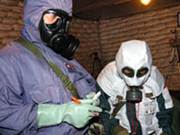China: Japan's disposal program far behind schedule

 0 Comment(s)
0 Comment(s) Print
Print E-mail CNTV, December 12, 2014
E-mail CNTV, December 12, 2014
After World War Two, the Japanese army left behind large amounts of chemical weapons in China. The largest stockpile was found in the Harbaling mountain region, near Dunhua city of northeast China's Jilin province. And yet it was only this December that Japan began official tests to dispose of the toxic materials left behind, which has prompted calls from China for greater progress and fast.
About 400,000 chemical weapons were buried by the Japanese in the Harbaling mountain region. China and Japan have long been in talks to dispose of these abandoned weapons, with Tokyo promising to fully protect the safety of local residents and the regional environment. Still, it took until October for the equipment needed to finally be set up. And disposal testing only officially started in December.
Destroying the chemical weapons leftover from war-time is required by the Convention on the Prohibition of Chemical Weapons. Japan's failure to so far follow through has become a major issue in its relations with China. To speed up the process, China has even assisted the Japanese side more than 200 times with its investigation, verification, and excavation work. In September 2010 and again in December 2012, China itself sent mobile destruction teams to the cities of Nanjing and Shijiazhuang. They safely collected and secured more than 50,000 chemical weapons left by the Japanese army.
By comparison, Japan has yet to destroy any weapons, despite beginning preparations as far back as 1990, and promising to complete all work by April 2007.
Japan's slow progress prompted Chinese Foreign Ministry spokeswoman Hua Chunying, to issue a statement on December 1st:
"The chemical weapons Japan abandoned in China are one of the most serious crimes committed during its militarist invasion of China. It has been nearly 70 years since the end of the war. The abandoned chemical weapons still pose a serious threat and danger to Chinese people's lives and property and the ecological environment of the regions concerned. China demands that the Japanese side increase investment in human and material resources to accelerate the destruction of the chemical weapons it abandoned in China."
In response, Tokyo said it would use newly-built facilities to accelerate the pace of destruction, and hopefully complete all work by 2022.






Go to Forum >>0 Comment(s)